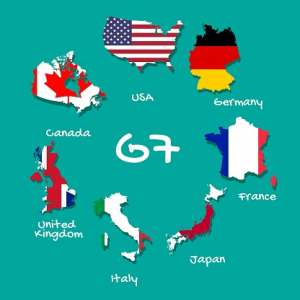G7 nations agree on global minimum tax
About G7
- The Group of Seven (G7) is a collective of seven of the world’s most industrialized and developed economies. Their political leaders come together annually to discuss important global economic, political, social and security issues.
- The G7 member countries are the United States, Britain, France, Japan, Germany, Italy, and Canada.
- Russia belonged to the forum from 1998 through 2014, when the bloc was known as the G8, but was suspended following its annexation of Crimea.
- India is not a member of the G-7 grouping.

Why in News?
- Finance Ministers from the G7 nations have reached a landmark accord setting a global minimum corporate tax rate, an agreement that could form the basis of a worldwide deal.
- The deal aims to end what U.S. Treasury Secretary Janet Yellen has called a “30-year race to the bottom on corporate tax rates” as countries compete to lure multinationals.
Why a global minimum?
- Major economies are aiming to discourage multinationals from shifting profits — and tax revenues — to low-tax countries regardless of where their sales are made.
- Increasingly, income from intangible sources such as drug patents, software and royalties on intellectual property has migrated to these jurisdictions, allowing companies to avoid paying higher taxes in their traditional home countries.
- With its proposal for a minimum 15% tax rate, the Biden administration hopes to reduce such tax base erosion without putting American firms at a financial disadvantage, allowing competition on innovation, infrastructure and other attributes.
How would a global minimum tax work?
- The global minimum tax rate would apply to overseas profits. Governments could still set whatever local corporate tax rate they want, but if companies pay lower rates in a particular country, their home governments could “top-up” their taxes to the minimum rate, eliminating the advantage of shifting profits.
- Talks are focusing around the U.S. proposal of a minimum global corporation tax rate of 15%. Any final agreement could have major repercussions for low-tax countries and tax havens.
Who are the targets?
- Apart from low-tax jurisdictions, the proposal for a minimum corporate tax are tailored to address the low effective rates of tax shelled out by some of the world’s biggest corporations, including digital giants such as Apple, Alphabet and Facebook, as well as major corporations such as Nike and Starbucks.
- These companies typically rely on complex webs of subsidiaries to hoover profits out of major markets into low-tax countries such as Ireland or Caribbean nations such as the British Virgin Islands or the Bahamas, or to central American nations such as Panama.
- The US Treasury loses nearly $50 billion a year to tax cheats, according to the Tax Justice Network report, with Germany and France also among the top losers. India’s annual tax loss due to corporate tax abuse is estimated at over $10 billion, according to the report.
What are the problems with the plan?
- Apart from the challenges of getting all major nations on the same page, especially since this impinges on the right of the sovereign to decide a nation’s tax policy, the proposal has other pitfalls.
- A global minimum rate would essentially take away a tool that countries use to push policies that suit them. For instance, in the backdrop of the pandemic, IMF and World Bank data suggest that developing countries with less ability to offer mega stimulus packages may experience a longer economic hangover than developed nations.
- A lower tax rate is a tool they can use to alternatively push economic activity. Also, a global minimum tax rate will do little to tackle tax evasion.
Where does India stand?
- In a bid to revive investment activity, Finance Minister Nirmala Sitharaman on September 21, 2019 announced a sharp cut in corporate taxes for domestic companies to 22% and for new domestic manufacturing companies to 15%.
- This, along with other measures, was estimated to cost the exchequer Rs 1.45 lakh crore annually. The cuts effectively brought India’s headline corporate tax rate broadly at par with the average 23% rate in Asian countries. China and South Korea have a tax rate of 25% each, while Malaysia is at 24%, Vietnam at 20%, Thailand at 20% and Singapore at 17%. The effective tax rate, inclusive of surcharge and cess, for Indian domestic companies is around 25.17%.
- While taxation is ultimately a sovereign function, and depends upon the needs and circumstances of the nation, the Indian government is likely to participate and engage in the emerging discussions globally around the corporate tax structure.
Reference:
Subscribe
Login
0 Comments
